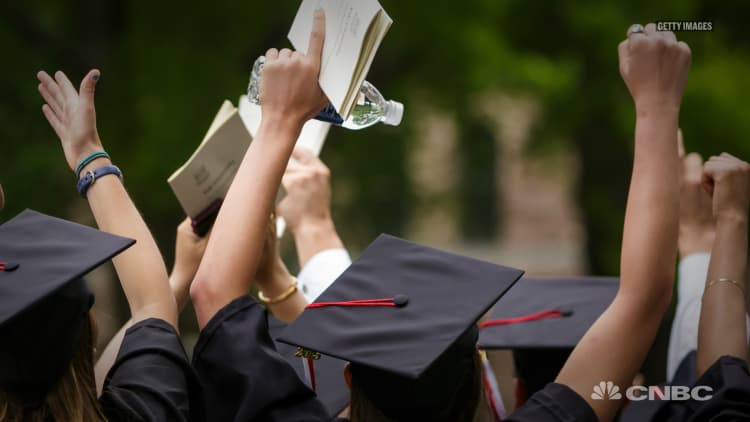Today, most colleges and universities require that applicants a standardized test, such as the SAT or the ACT, as part of applying. As a result, roughly 2 million students in the U.S. take the SAT each year, hoping for a score high enough to earn them admission to their target school.
But in the wake of the Varsity Blues scandal, many are questioning the advantages that wealthy students benefit from throughout the college application process, including the advantages they enjoy around standardized testing.
The scandal centered on William Rick Singer, who parents paid a collective $25 million to help their children gain admittance into exclusive colleges and universities by bribing school officials and arranging for students to get extra time on standardized tests, for professionals to take the test on behalf of students and for proctors to fix incorrect answers.
But many of the wealthy students Singer's scheme was meant to help already had a leg up on their peers.
Researchers have repeatedly found that wealthy students enjoy significant advantages throughout the college application process, and that income greatly impacts a student's performance on standardized tests. In a 2013 paper titled, "Race, Poverty and SAT Scores," researchers Ezekiel J. Dixon-Roman from the University of Pennsylvania and John J. Mcardle from the University of Southern California found that wealthy students earn higher SAT scores compared to their low-income peers and that the difference in SAT scores between high- and low-income students was twice as large among black students compared to white students.
According to the Washington Post, in 2014 "students from families earning more than $200,000 a year average a combined score of 1,714, while students from families earning under $20,000 a year average a combined score of 1,326."
A 2015 analysis from Inside Higher Ed found that in each of the three parts of the SAT (reading, writing and language and math), the lowest average scores were among students from families who make less than $20,000 in family income, while the highest averages were among students from families who make more than $200,000. Inside Higher Ed reports that the biggest gaps were on the reading section, in which students with family incomes below $20,000 earned average scores of 433, while students with family incomes above $200,000 earned average scores of 570.
Wealth doesn't just impact SAT scores. According to a recent report from the Georgetown Center on Education and the Workforce, "Born to Win, Schooled to Lose," being born wealthy is actually a better indicator of adult success in the U.S. than academic performance. "To succeed in America, it's better to be born rich than smart," Anthony P. Carnevale, lead author of the report, told CNBC Make It.
Here's why rich students perform better on the SAT:
Costs
One reason wealthier students get higher SAT scores is because they can afford to take the test several times, which has been known to increase a students' score.
The cost to take the SAT during the 2018-2019 school year was about $47.50 for the basic test and $64.50 to take the test with the full essay section. To take an SAT subject test, students must pay a $26 registration fee, $22 for each additional test and $26 for each language test.
These costs can be prohibitively expensive for many students. Many low-income students are provided fee waivers that cover two free SATs, with or without the essay, and six free SAT subject tests. But wealthy students are still more likely to have taken standardized tests like the SAT more than once.

Academic support
Students who live in wealthy school districts typically attend better-funded schools. These funding disparities mean that wealthy students are more likely to attend high schools that will give them advantages in the college application and standardized test-taking processes.
Wealthy students are more likely to attend high schools with a significant number of AP classes, more likely to have access to tutors and more likely to have taken standardized test preparation classes — all advantages that have been tied to higher standardized test scores.
Extra time
Students from high-income families are also more likely to get additional time during standardized tests than their lower-income counterparts.
The Wall Street Journal analyzed data from 9,000 public schools and found that students in affluent areas are most likely to get special "504 designations," typically provided to students with anxiety or ADHD, which allow special academic accommodations, like extra time or a private space when taking exams of all sorts — including the SAT.
The technique is so effective that Singer himself advised families to do so.
"Singer counseled parents to seek extended time on the exams, including by having their children purport to have learning disabilities in order to obtain medical documentation that ACT, Inc. and the College Board typically required before granting students extended time," reads the indictment from the Massachusetts Department of Justice.
"Test optional"
The indictment also states that "most selective colleges in the United States require students to take a standardized test, such as the ACT or the SAT, as part of the admissions process." Most schools do require students to take tests such as the SAT, but a growing number of schools — including the University of Chicago, Bowdoin College and DePauw University — that have started to move away from requiring applicants take standardized tests.
FairTest, an advocacy group that draws attention to the biases in the current standardized testing processes, lists as many as 330 test-optional and test-flexible schools in the U.S. According to a study titled Defining Access: How Test-Optional Works, colleges that are considered "test optional" enroll — and graduate — a higher proportion of low-income students, first generation-students and students from diverse backgrounds.
Still, some say that standardized testing is one of the most objective measures currently at schools disposal for assessing student achievement and potential.
"Standardized tests can level the playing field for low-income and rural college applicants," writes Rich Saunders for the Chronicle of Higher Education. "Making those tests optional may blunt that benefit."
Like this story? Subscribe to CNBC Make It on YouTube!
Don't miss:



